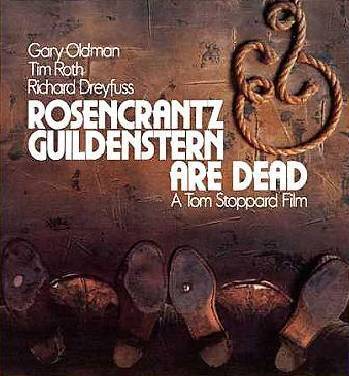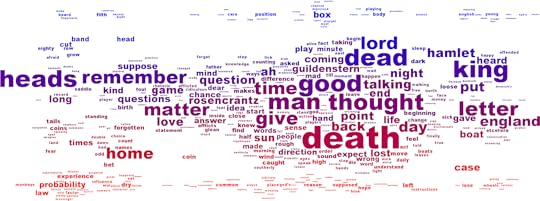What do you think?
Rate this book


126 pages, Paperback
First published January 1, 1966
-----------------------------------------------------------
-----------------------------------------------------------
"We're tragedians you see. We follow directions - there is no choice involved. The bad end unhappily, the good unluckily. That is what tragedy means."


 A revisit via youtube: https://www.youtube.com/watch?v=T4SVV...
A revisit via youtube: https://www.youtube.com/watch?v=T4SVV...

Ros Fire!I settled for a 4-star rating, since it was 5 stars the first time around and 3 stars now. The truth always lies somewhere in the middle. ;)
Guil jumps up.
Guil Where?
Ros It's all right – I'm demonstrating the misuse of free speech. To prove that it exists.
Life is a gamble, at terrible odds. If it were a bet you wouldn’t take it.Rosencrantz and Guildenstern are characters in William Shakespeare's tragedy Hamlet. They are childhood friends of Hamlet, summoned by King Claudius to distract the prince from his apparent madness and if possible to ascertain the cause of it. When Hamlet kills Polonius, Claudius recruits Rosencrantz and Guildenstern to escort Hamlet to England, providing them with a letter for the King of England instructing him to have Hamlet killed. (They are apparently unaware of what is in the letter, though Shakespeare never explicitly says so.)
We cross our bridges when we come to them and burn them behind us, with nothing to show for our progress except a memory of the smell of smoke, and a presumption that once our eyes watered.Stoppard also littered his play with jokes that refer to the common thespian tendency to swap Rosencrantz and Guildenstern in the midst of the play because the characters are basically identical. He does this by making Rosencrantz and Guildenstern unsure of who is who, as well as having the other players (Claudius, Hamlet, Gertrude) refer to them frequently by the wrong names.
We do on stage things that are supposed to happen off. Which is a kind of integrity, if you look on every exit as being an entrance somewhere else.Metatheatre is a central structural element of Rosencrantz and Guildenstern Are Dead. Scenes that are staged as plays, dumb shows, or commentaries on dramatic theory and practice, are prominent in both Stoppard's play and Shakespeare's original tragedy Hamlet. In Hamlet, metatheatrical elements include the Player's speech (2.2), Hamlet's advice to the Players (3.2), and the meta-play "The Mousetrap" (3.3). Since Rosencrantz and Guildenstern are characters from Hamlet itself, Stoppard's entire play can be considered a piece of metatheatre.
Rosencrantz: I don't believe in it anyway.And so I will end with one of the biggest compliments I could ever give: Oscar would’ve loved this!
Guildenstern: What?
Rosencrantz: England.
Guildenstern: Just a conspiracy of cartographers, then?